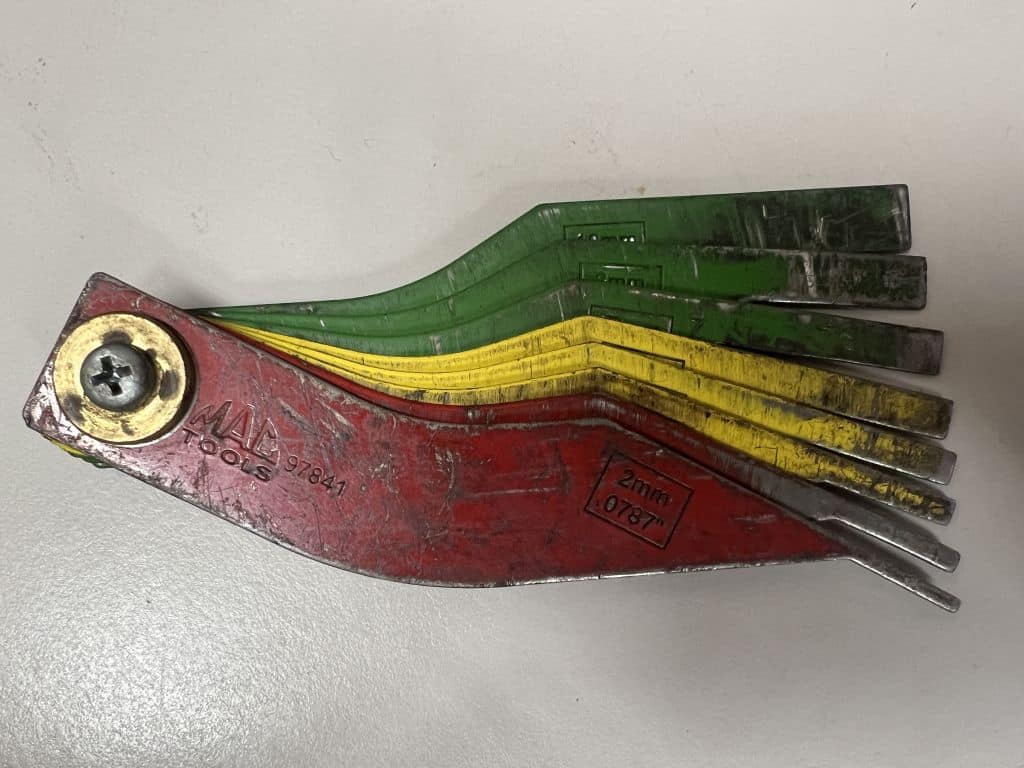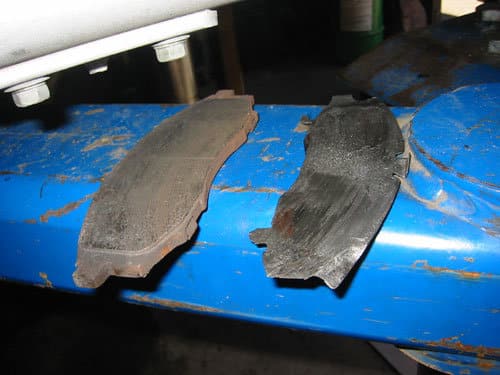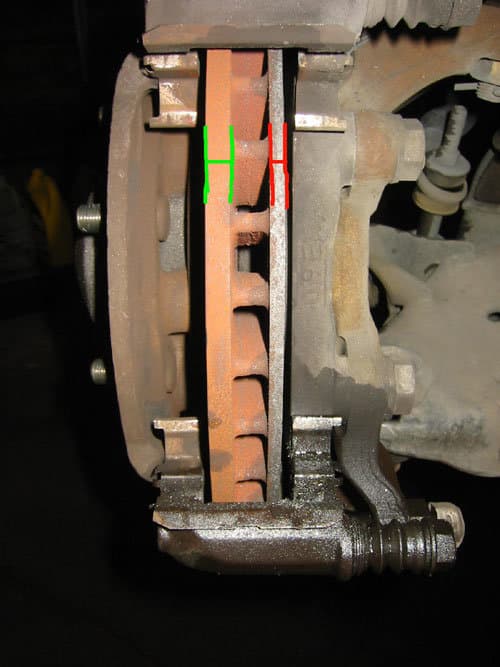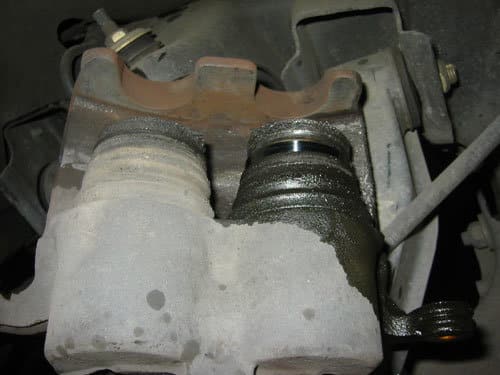Brake inspection is important. If you wait too long to inspect your brakes, you may end up with a lot of unnecessary damage and a big repair bill, so it makes sense you have your mechanic check your brakes regularly.
But how can you tell if you really need brakes? Mechanics have a bad reputation and it’s not entirely undeserved. How can you as a car owner know when the inspection results are urgent and when they’re an early sale? In this article give you some information so you can make informed decisions when presented with brake inspection data, and we’ll explain why it’s important to check your brakes periodically.
When should you replace your brake pads? How many mm is too few? Some mechanics will make it sound like the sky is going to collapse if you don’t replace your brakes right this second.
You might have brought your car to the shop for a 5K service, which includes a brake inspection. The brakes feel fine. No noise, sponginess, pulsation, and the car stops great.
Yet now there’s a guy on the phone and he says you need the brake pads TODAY. RIGHT NOW! The car just isn’t safe anymore. “If you don’t care about your own safety, at least think of the other motorists on the road! Grandmas in crosswalks! Adorable little puppies! How could you possibly consider driving away from our shop with only 4mm of brake pad left!”
But wait. 4mm isn’t worn out. That shop’s policy may be to recommend brakes at 4mm, but most people, including me, wouldn’t call that “worn out” or unsafe.
How to tell if brake pads are bad
Everybody seems to have their own opinion. The tool on the right is used to measure brake thickness. It turns “red” at 3mm. Is a brake pad worn out at 3mm? Once again, it depends on who you ask. This gauge is yellow all the way up to 6mm, implying that a 6mm brake pad isn’t all that great. I think I’m going to disagree with that pretty strongly.
Where did these green, yellow, red, specifications come from?
If only there were a final word. An authoritative source everyone can agree is valid.

The ultimate word on how to check brake pads
Who gets to say when to change brake pads? Here are some possibilities.
- The manufacturer (They designed the car, right?)
- You (It’s your car and your money)
- Your mechanic (Maybe he’s stomping his feet and won’t “let” you leave without a tow truck.)
- The State of California (Auto repair is a regulated business.)
- The City of Berkeley (Well, they have their own health department. Maybe there’s a Minister of Car Brakes too?)
Who get to say when to replace brake pads – how many mm is worn out? As it turns out, there’s one answer with legal weight. The company that made the car gets to decide the minimum brake pad thickness specification, and they publish this information in their service manual.
If a mechanic says that brakes are “unsafe” or “worn out”, then the brake pads should be at or below the minimum specification published by the manufacturer. For many cars, this is when the pads are 1mm thick.
Everything else is just an opinion. Opinions can be presented as recommendations, but not as fact. Characterizing brake pads as “worn out” or “unsafe” when they aren’t under the thichness specification is fraud.
Are opinions brake pad wear valid?
Opinions on when brake pads should be replaced are valid. We recommend you replace your brake pads at 2mm or even 3mm at times. Are we trying to rip you off? No. We have reasons for this and we’re happy to share.
For instance, Honda wear sensors start rubbing and making a squeaking noise when the pad is 2mm. What if you came in for a brake inspection and your pads were just over 2mm. They aren’t worn out, and we’re not going to say that they are.
But what if your brakes start making noise later that week. You just had the car in. Why didn’t we say anything about the brakes?
Another reason to replace brake pads slightly before they’re worn out is that brake pads are a little more fade resistant when they’re thicker. Most of the time brake fade isn’t an issue, but in extreme conditions it can be.
You could think of it sort of like tires. Tires are “worn out” at 2mm, but don’t work very well in rain under 4mm, and don’t work very well in the snow under 6mm. When you replace them depends a little on the conditions.
The same is partially true of brake pads. If you have a flat freeway commute, it might be fine to run the pads until they’re worn out. Are you Speed Racer? Maybe you should keep a little more pad in reserve.
Fear is an effective sales tool
Nobody wants to be “that guy”. You know, the one doesn’t maintain his car and breaks down on Hwy 80 clogging traffic. Or the guy who doesn’t fix his brakes and causes an accident. Simple work like brake replacement is profitable and doesn’t require a mechanic on the high end of the pay scale. Shops like to sell brakes and struts because they make good money doing those types of jobs. Playing on people’s fears is an effective way to increase sales.
DIY brake pad inspection
Considering checking your brake pads yourself? It’s a bit of a pain doing this type of work without a lift, but as far as DIY car projects go, it’s not very high on the difficulty scale.
A visual inspection of the brake friction material is how brake pads are “measured”. Typically, it’s impossible to directly measure brake pads unless you remove them from the brake caliper. You’ll likely need to hold a ruler or other measuring device near the pads and visually compare.
Also, remember there is more to a brake system than just the pad thickness. I’d recommend having a professional look at the car, especially if you have a low brake pedal or brake fluid leak.
Don’t be afraid to ask questions
So, if you’re told your brakes are “worn out” or “unsafe”, ask for the pad measurement and the manufacturer’s minimum specification. Honestly, we don’t often look it up, but we certainly will if you ask.
Most of the cars we work on the minimum brake pad thickness is 1mm. We’ll usually recommend brake pads at 2 or 3mm. However, we’re never going to say that the brakes aren’t safe, or you shouldn’t drive, or any other scary stuff. If you ask if you can wait a month or two, the answer is yes, you’ll likely be fine.
AN OUNCE OF PREVENTION IS WORTH A POUND OF CURE
This old axiom provides a concise summary of why brakes should be regularly inspected, and cars should be brought in at the first sign of brake trouble. What could have been a $450 repair bill can easily grow to $1500 or more with just a few more miles of driving. A simple brake inspection can save you a lot of money.

WHAT’S METAL TO METAL MEAN?
“Metal to metal” brakes. It means the brake pads or shoes that have worn through all of their friction material. The metal backing of the pad or shoe rubs on the rotor or drum (also made of metal). When brakes go “metal to metal”, there is a noticeable low-pitched grinding and vibration when braking, especially at lower speeds.
DAMAGE HAPPENS QUICKLY
Continuing to drive once brakes go metal to metal brakes will quickly increase your repair bill. The picture above is a set of brake pads that were ignored for so long that the metal backing was ground thin enough to be ejected from the caliper. The only thing left of the pad on the right is the anti-squeal shim.
The brake pad backing, and the brake rotor are roughly the same hardness. When the friction material has worn out, the pad backing, and the rotor make contact and both wear away very quickly. A rotor that might have been machinable shortly before the brakes went metal to metal, now may need to be replaced. Rotors will eventually wear to below the minimum thickness even if the pads do not go metal to metal. However, letting the pads wear beyond minimum thickness will hasten the need for rotor replacement.

SEVERE DAMAGE CAN OCCUR
The rotor on the above went metal to metal on the inner (right) side. Both sides of the rotor were the same thickness. Now the inner side has worn down to almost half the thickness of the outer. Car manufacturers publish minimum thickness specifications for their brake rotors. If the brake rotor falls below the minimum thickness specification, it must be replaced.
Calipers may be damaged too
Rotors are not the only components that can be damaged by ignoring brakes in need of service; the brake calipers can also be destroyed by continuing to drive on bad brakes. Once a pad is ejected or worn too thin, the caliper piston can hyper-extend and come out of the bore. This one extended so far, the fluid leaked out. When this happens, the calipers must be replaced. The calipers are not normally replaced during a brake job. This expense could have been avoided.

We’d be happy to check your brake pads
If you’re in Berkeley or nearby Oakland, Emeryville, Albany, Orinda, El Cerrito, or Richmond, and own a Toyota, Subaru, Honda, or Mazda, we’d be happy to inspect your brake lining thickness. We charge for 1/4 hour of labor but guarantee an honest assessment without sales pressure. If not, I hope this article helps you in communicating with your auto mechanic.
